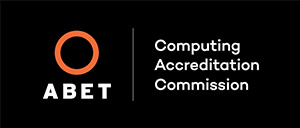
Online Bachelor's Degree in Cybersecurity
Complete this form to receive the Purdue Global program guide.
Bachelor's Degree in Cybersecurity Overview
According to a 2025 report, there are 514,359 open cybersecurity jobs in the U.S. It’s your time — earn your degree 100% online and be ready to meet the fast-growing demand.
- Learn to identify IT security threats, implement solutions, and master the skills to keep companies and organizations safe from a wide range of cyberthreats.
- Prepare for important, industry-recognized certifications.
- Choose from several cybersecurity concentrations:
Proven, Data-Driven Student Outcomes
Master the skills and knowledge that employers need. Review our assessment data measuring course outcomes and graduation rates.
Review College Scorecard data for this program.

Purdue Global's School of Business and Information Technology has received programmatic accreditation for the following programs:
-
The Bachelor of Science in Cybersecurity is accredited by the Computing Accreditation Commission of ABET, https://www.abet.org.
-
The Bachelor of Science in Information Technology is accredited by the Computing Accreditation Commission of ABET, https://www.abet.org.
With ABET accreditation, students, employers, and all those served by the University can be confident that a program meets the quality standards that produce graduates prepared to enter a global workforce.

National Center of Academic Excellence
Purdue Global has been designated as a National Center of Academic Excellence in Cyber Defense Education (CAE-CD) for the Bachelor of Science in Cybersecurity and Master of Science in Cybersecurity Management.
See Notes and Conditions below for important information.
Military Transfer Credit
Servicemembers and veterans, get the recognition you deserve and earn your degree faster with our PME2Degree® program. Use our Military Transfer Credit Estimator to see how much of your occupational and military training counts as college credit.
Purdue Global Is Accredited by the Higher Learning Commission
The HLC (HLCommission.org) is an institutional accreditation agency recognized by the U.S. Department of Education.
Calculate Your Time and Cost
Estimate how much your prior learning credits can reduce your tuition and time to graduation.
What Courses Will I Take?
Courses focus on the fundamentals of cybersecurity and applying industry-accepted and emerging practices to solve real-world security problems.
All courses are updated regularly by our dedicated curriculum department and advisory board to ensure they reflect the most recent developments in the field.
Sample Courses
- Ethical Hacking
- Network Security
- Python Programming
- Digital Forensics
- Intrusion Detection and Response
Program Requirements
1 semester credit hour = 1.5 quarter credit hours
3-Week Trial
Not sure if Purdue Global is right for you? Try an undergraduate program for an introductory 3-week trial period.
There’s no financial obligation and no cost to apply. That’s the Purdue Global Commitment.
Students who choose to continue at Purdue Global will be billed for the full first term's tuition, including the 3-week trial. See Notes and Conditions below.
Admissions Requirements
You must be a high school graduate or possess a General Educational Development (GED) certificate or other equivalency diploma. You must also complete orientation before you start classes.
Refer to the University Catalog or speak to an Advisor to learn more.
Upcoming Start Dates
We offer multiple start dates to give you flexibility in your education, life, and work schedules.
Cybersecurity Concentrations
Concentrations in cybersecurity allow you to focus on an area of study that best fits your career path.
CISSP Certification Preparation
Gain the foundational knowledge of security governance, risk management, business continuity planning, and compliance that prepare you for this certification.
Data Management
Develop skills in information assurance, risk management, and more while learning how to program in cloud environments using in-demand scripting languages.
Game Development
Study software development, the C# game programming language, the Unity game development engine, and the process of adding artistic elements to video games.
Software Development Using Python
Explore software development concepts using the Python programming language while applying related approaches to data structures, algorithms, web services, graphics, mobile, and multimedia. Python is a versatile language known for its beginner friendliness, making it widely used.
Supply Chain Management and Logistics
Learn key processes of global supply chain management, logistics, distribution, purchasing and vendor management, and supply chain analytics.
Prepare to Sit for Industry Certifications
The bachelor’s degree program provides you with the depth and breadth of materials to pursue many of the critical certifications recognized by the information assurance community and for Department of Defense (DoD) personnel, as mandated by DoD Directive 8570.1.
Earn Credit for Prior Certifications
If you’ve already completed certification exams, you may be eligible for credit toward your degree.
See Notes and Conditions below for important information.
Get a Head Start on Your Master’s Degree
Complete your master’s degree sooner with a graduate program pathway. It weaves graduate-level courses into your bachelor’s program, giving you a jump on your master’s degree requirements. You’ll save on time and tuition compared with finishing both programs separately.
Plus, your degrees don’t have to be in the same fields. You can customize your academic journey to support your career goals and interests. To learn more, view the University Catalog or connect with an Advisor.
See Notes and Conditions below for important information.
Earn Credit for Prior Coursework and Experience
The average bachelor's degree student pays $15k and takes 2.3 years to complete their degree.
Ways to Save on Time and Tuition
Purdue Global works with students to find ways to reduce costs and make education more accessible. Contact us to learn about opportunities to save on your educational costs.
Transfer Credits
Earn credit for prior coursework completed at eligible institutions, including community colleges.
Prior Work Experience Reduction
You could earn undergraduate credit for your life and professional career experiences.
Financial Aid
Learn about federal financial aid programs available for many of our degree programs.
Grants and Loans
Learn about federal and state grants and loan programs that may be available.
Corporate Partner Benefits
Employees of Purdue Global partner organizations may be eligible for special tuition reductions.
Military Tuition Reduction
Undergraduate tuition savings for military include a 55% reduction per credit for current servicemembers and 38% per credit for veterans.
Prior Military Experience
Earn credit for your military training. The average Purdue Global military student is awarded 54% of the credits needed for an associate's and 45% of the credits needed for a bachelor's.
View the total cost of attendance for your program.
Possible Behavioral Interview Questions for This Field of Study
- Tell me about a time when you had to solve a problem you had never seen before. What steps did you take?
- Give me an example of a time you had to balance multiple deadlines. How did you stay organized?
- Give me an example of a time you made a mistake. How did you handle it? What did you learn?
- Describe a time when you worked with someone who had a different working style from yours. How did you approach/handle it?
- Have you ever had to explain a technical concept to someone without a technical background? How did you do it?
Sample Skills Developed and Used in This Field
- Project Management
- Troubleshooting
- Computer Science
- Problem Solving
- Information Technology
- Python (Programming Language)
- Planning
- Microsoft Azure
- Amazon Web Services
- IT Security
- Ethical Standards and Conduct
- Operating Systems
- Information Systems
- Systems Engineering
- Data Analysis
Download the Program Brochure
Download our brochure to learn more about the online Bachelor of Science in Cybersecurity and the benefits of earning your degree at Purdue Global. Prepare yourself for success with a bachelor’s degree in cybersecurity.
Why Choose a Bachelor's in Cybersecurity
Cybersecurity professionals are in demand. See how an online cybersecurity degree can get you started.
Get to Know Our Faculty
Purdue Global faculty members are real-world practitioners who bring knowledge gained through the powerful combination of higher learning and industry experience.
Faculty members who have advanced degrees
Faculty members who have terminal degrees
Faculty publications in 2024–2025
Professional development hours logged by faculty in 2024–2025
Statistics include all Purdue Global faculty members and are not school- or program-specific calculations. Source: Purdue Global Office of Reporting and Analysis, August 2025. 2024–2025 academic year.
